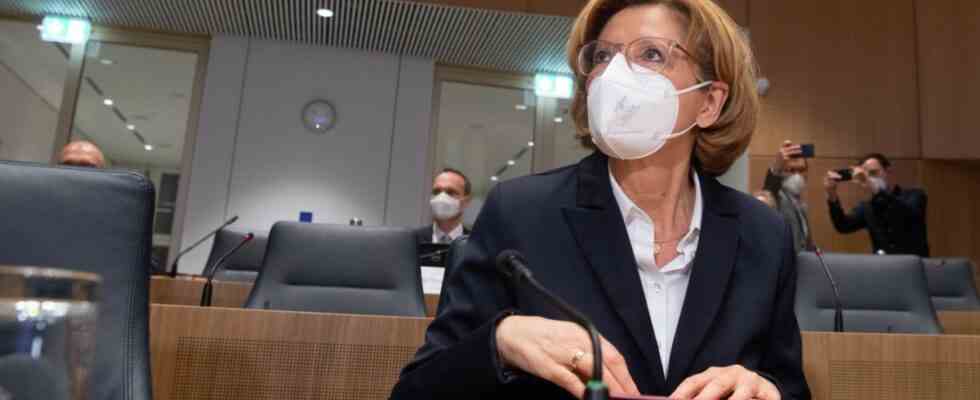It’s dark in front of the windows of the Mainz state parliament when the journalists line up again inside, when microphones are pushed into place, cameras flash, television cameras roll when everyone looks at a chair.
The investigative committee on the flood disaster has been meeting since October. State secretaries, mayors, climate experts and people who were supposed to explain why the small river Ahr could become a torrent last summer, what they knew when about water levels, forecasts, the extent of the destruction.
A particularly large number of journalists lined up this Friday because the witnesses were so well known: Prime Minister Malu Dreyer and Interior Minister Roger Lewentz (both SPD). When did you have what information? What did they do with it?
“I hear that the high water level won’t be reached until noon tomorrow?”
Prime Minister Malu Dreyer takes her seat shortly after 10 p.m., when the MPs have been listening to witnesses for 13 hours. She places her notes on the table in front of her, tightly written sheets, a few passages underlined.
On July 14, 2021, on the day of the flood, she expected severe flooding, but there were no indications “that such an unprecedented flood catastrophe would occur”. Not in the afternoon when the interior minister left a joint plenary session to go to the region, not in the evening when he reported to her on the way back that he had seen a “calm and focused” crisis team. At 9.42 p.m. – by then the Ahr had already destroyed houses – she texted him: “I hear that the high water level will not be reached until midday tomorrow? It’s really bad.”
Where did she get this false information from?
Dreyer says she can’t remember.
Did she know that the head of the State Office for the Environment wrote in an email to several state secretaries at 6:44 p.m.: “A catastrophe is looming here”?
Dreyer said she was not informed about this.
At 12:58 a.m., the Minister of the Interior wrote to her: “The situation is escalating (…) there may be / may have been deaths. Our helicopters flew over it, received light signals with flashlights, but could not go down. There were probably very sad scenes.”
Dreyer said she didn’t see that text message until around 5 a.m. the next morning.
Dreyer says she trusted civil protection
And so she sticks to her core statements, even if the deputies keep asking questions. The first: On July 14, the extent of the disaster was not foreseeable. The second: There have always been floods in Rhineland-Palatinate, on the Rhine, on smaller rivers, on the Hornbach and Schwarzbach. The civil protection on site was experienced, she trusted him, and the supervisory and service directorate also offered the districts help.
Roger Lewentz, her interior minister and confidant, had already answered questions from the MPs in a similar way. He also assumed a “strong but manageable flood”, on the way to the Ahrweiler district the roads were passable and the bridges were intact.
When he arrived at the operations center around 7.20 p.m., he met District Administrator Jürgen Pföhler (CDU), they had talked about the town of Dorsel, where people had climbed onto their mobile homes at the campsite and were waiting to be rescued by a helicopter, but Campsites, said Lewentz on Friday, are often on the river and are often flooded, including this one. Otherwise, he had experienced a crisis team working in a concentrated manner, all seats were occupied, the computers worked, nobody had asked for support.
That Jürgen Pföhler was only briefly on the crisis team that evening? Lewentz said he didn’t know that. That the employees of the crisis team in the basement of the district office had no cell phone reception? Lewentz said he didn’t notice. Even words like flood or flash flood were not mentioned. At around 7.45 p.m. he said goodbye again.
Why didn’t Lewentz take over the operations command?
Roger Lewentz spoke at length this Friday, he listed phone calls he made, text messages he wrote, he wanted to anticipate the question that was asked again and again in the weeks after the flood: Why didn’t he take over the command of operations? instead of leaving them to the district administrator. Lewentz said he made the offer, but the district administrator didn’t put the country in charge until July 17.
The Koblenz public prosecutor’s office is now investigating Jürgen Pföhler and another member of the crisis team. The accusation: negligent homicide by omission. They triggered the disaster far too late, people drowned in a home run by Lebenshilfe in Sinzig because they could no longer be taken to higher floors.
It is shortly before midnight in front of the Mainz state parliament when all the witnesses have been heard, when the chair in the plenary hall is empty and will remain empty. The opposition says goodbye with two demands: The Free Voters want the resignation of Federal Minister for Family Affairs Anne Spiegel (Greens). Last summer she was Minister of the Environment in Mainz and as such responsible for flood protection and the forecast of the level. On the afternoon of July 14, however, she sent out a press release stating that “extreme flooding” was imminent – even later that evening her ministry did not correct it. On Friday, a crisis researcher accused her of causing “communicative chaos”.
From the CDU it was said that the responsible ministries had only exchanged insufficient information, the parliamentary manager spoke of “inactivity and passivity” on the part of the state government. Both the prime minister and the interior minister should be summoned again once all the files have been evaluated.

